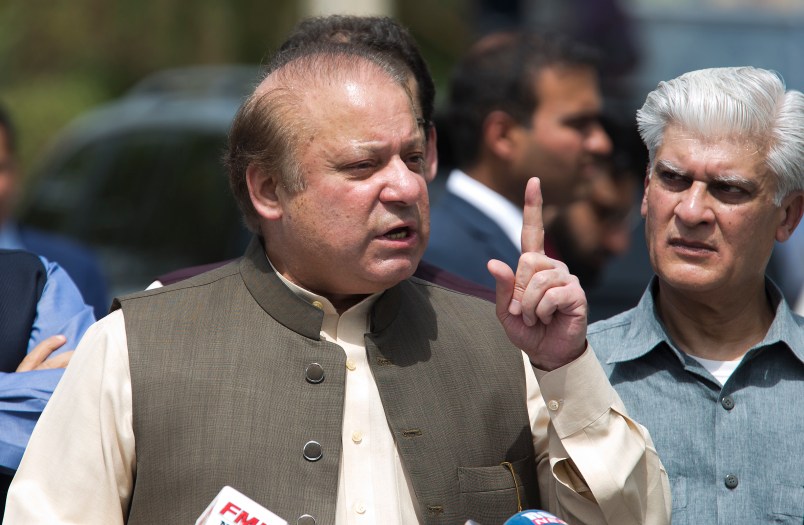ISLAMABAD (AP) — Pakistan’s prime minister stepped down on Friday, hours after the country’s Supreme Court disqualified him from office in dramatic developments that have plunged the nuclear-armed nation into another major crisis.
A five-judge panel of the top court disqualified the thrice-elected Nawaz Sharif following a petition filed by the opposition, which had levelled corruption allegations against the prime minister and his family members.
It is not the first time the Pakistani judiciary has ordered dismissal of an elected prime minister. The court also ordered that criminal charges be filed against Sharif and his family.
The court panel, in a unanimous decision, said Sharif was disqualified for not remaining “truthful and honest” in the face of the evidence against him. It also ruled that Sharif could no longer serve as a member of the National Assembly, the powerful lower house of parliament.
The landmark ruling threw Pakistan, which is battling a stubborn militancy, into political disarray and triggered questions over who will succeed Sharif as prime minister — and even questions on who is leading the country at the moment.
Sharif’s supporters, though dismayed by the ruling, suggested that Pakistan’s powerful military — which had once before overthrown Sharif in a bloodless coup — were crowing at the court’s decision because they have viewed the prime minister as an upstart who sought to challenge the army’s authority.
The military, which has ruled for more than half of Pakistan’s 70-year-long history, is considered the country’s most powerful institution, a position it has been unwilling to see challenged.
Sharif’s political opponents, many of whom have questionable corruption records themselves, welcomed the court decision as a vindication of their months-long battle and proof that even the politically powerful can be held accountable.
Opposition supporters danced in the streets and opposition leader Imran Khan called on followers to head to Islamabad on Sunday for a major celebration in their legal battle against the “corrupt ruling elite.”
Khan congratulated the judiciary on dismissing Sharif and described the disqualification as a “good omen” for Pakistan. He told reporters at a news conference that he hopes all those who looted the nation’s wealth would face a similar fate.
The current case against Sharif and his family dates back to 2016, when documents leaked from a Panama-based law firm indicated that Sharif’s sons owned several offshore companies.
Sharif’s son Hussain Nawaz at the time acknowledged owning offshore companies but insisted they used legal money to set up businesses abroad.
However, the court-appointed investigators in July concluded a significant disparity existed between the Sharif family’s declared wealth and its known sources of income.
The Supreme Court on Friday also ordered Pakistan’s anti-corruption body to file corruption charges against Sharif, his two sons and daughter in the next six weeks for concealing their assets.
The panel also ordered corruption charges filed against Finance Minister Ishaq Dar, a close relative of Sharif.
Sharif’s party expressed its disappointment over the court orders and urged their followers to remain calm and avoid confrontations.
“This decision is not surprising, but we are disappointed,” Information Minister Maryam Aurangzeb told reporters shortly after the ruling. She said their Pakistan Muslim League ruling party will issue a detailed reaction after consulting Sharif’s advisers.
The court also asked Pakistan’s figurehead President Mamnoon Hussain to “ensure continuation of the democratic process.”
Hussain was expected to convene the National Assembly once Sharif’s ruling party nominates his successor. That person would serve as prime minister until June 2018, when the next general elections are to be held.
In the jam-packed courtroom early Friday morning, the Supreme Court announced its decision and asked the Election Commission of Pakistan to issue a notification of Sharif’s removal. But Sharif quickly stepped down, saying he did it to show respect for the country’s judiciary.
However, in a statement, Sharif’s office said justice had not been served.
Sharif’s resignation has left constitutional experts at a loss to explain who is in charge in Pakistan until a successor is nominated. It wasn’t immediately clear when that would be or who it could be.
Legal experts say Sharif will now nominate a lawmaker of his choice to replace him under constitutional rules. They say Sharif’s nominee will be elected by the National Assembly, where the ruling party enjoys a comfortable majority.
Hashmat Habib, a legal expert, said the court’s order was binding and that Sharif and his family may not challenge it.
It’s not the first time that Pakistan’s judiciary has ordered the dismissal of an elected prime minister. In 2012, the court convicted the then-Premier Yusuf Raza Gilani in a contempt case, forcing him to step down.
Opposition lawmakers, who petitioned the court for disqualification of Sharif, welcomed the court decision, saying it was a victory for justice.
Sirajul Haq, who heads Pakistan’s Jamaat-e-Islami party, told reporters that he had been fighting a legal battle to ensure the accountability of the “corrupt ruling elite.”
Sharif’s daughter, Maryam Nawaz in a tweet said the prime minister was sent home, “but only to see him return with greater force.” She asked her party to “stay strong.”







I really need someone to explain all this better. I don’t know who the good guys and bad guys are. The Panama papers exposed a lot of politicians and rich people hiding their ill-gotten wealth in some pretty suspicious offshore accounts. This does seem particularly destabilizing for the region though and probably should be of real concern to us since they are a nuclear power. Like I say, I can’t tell who the players are without a scorecard. Too bad we have an Idiot in the White House, that even after its explained to him, still won’t understand unless it affects his own personal bank account.